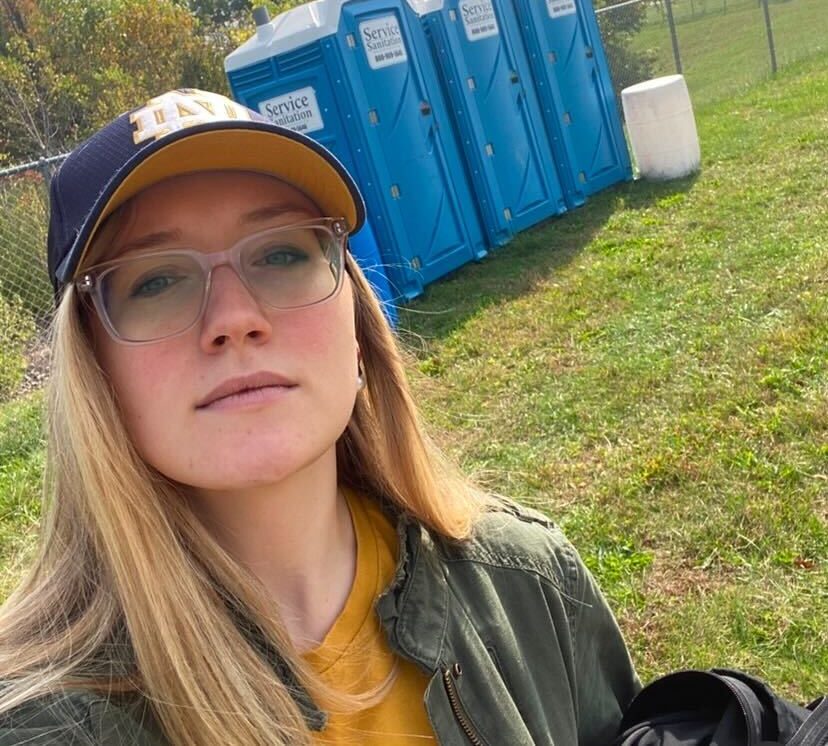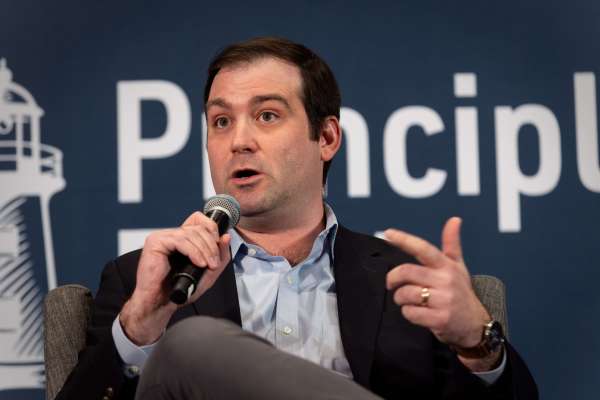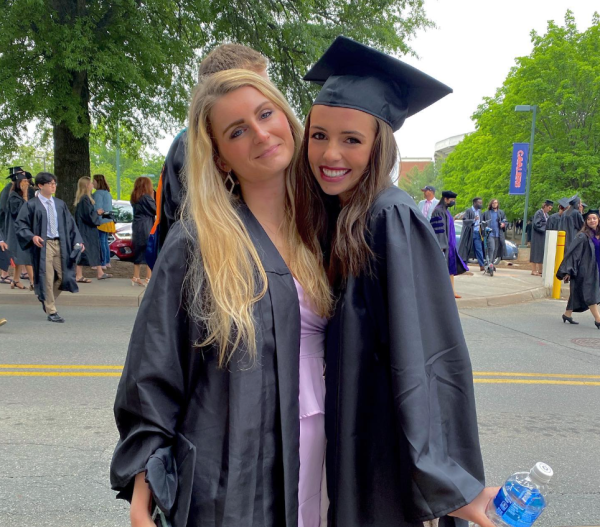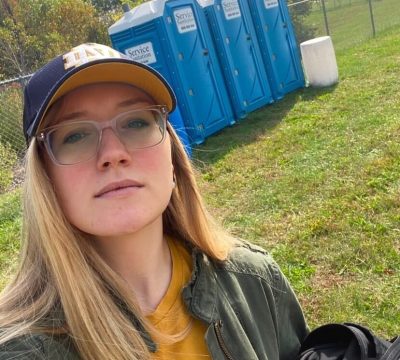Hey all!
I’ve been a reader of The Dispatch for five years now—starting when I was Jonah’s intern, so feel free to dig through the archives to find the 2020 Remnant episode on which I briefly appeared—and I can’t tell you how happy I am that I’ve finally joined this team.
It was also a treat to answer your questions! I know I haven’t been at The Dispatch very long—I started the same day a much more famous blond started (re-started?) his job—but I’m already excited to meet even more of you someday at our future events. Without further ado, let’s get to your questions!

On Her Personal Life
Ejtarbox, and many others, asked: “Why pick port-a-potties for a background?”
One of you assumed that it was because I was on latrine duty as the lowest-ranking Dispatch member; another person kindly told me via email that they “just assumed it was a metacommentary on the disposability/ephemerality of contemporary visual art, or the toxicity of self-performance in modern communications media.” Unfortunately, the real reason is much more boring: I had just flown into Chicago from New York the previous night, and gotten up early that morning to drive with a high school friend to watch Notre Dame slaughter Stanford. This particular picture was taken somewhere in one of Notre Dame’s auxiliary parking lots (read: fields), and I was feeling blearily amused as I waited for my friend to get out of the bathroom. I took a selfie to capture that feeling.
Some of you have also asked about my connection to Notre Dame. I did not matriculate there, but it is a fact that if you’re Catholic and live on the South Side of Chicago—and, to answer another question, if you attend Marist High School—you are a Notre Dame fan and aspire to go there. (My family also has a cabin about 25 minutes south, in Koontz Lake.) However, there was another college in my future …
MikeA.76 asks: “Why did you go to Yale?”
I would like to lie, as I did on my application, and say that I wanted to go to Yale because of a particular professor or academic program. But in truth I went because it was, well, Yale. I grew up not really thinking about elitism or progressivism or any of those fancy -isms; I mostly thought about Pokémon and math homework, and I liked driving my car. I applied to Yale mostly because I liked Gilmore Girls and because I was good at school, and since there was no way I was going to get in, I planned instead to study engineering or math at a place like Purdue, or Urbana-Champaign, or Loyola. (I also had a brief affair with St. Louis University, but I felt weird about going to a school without a football team.)
But then I got in. And thank God I did, because those other places would’ve left me buried in debt and Yale’s financial aid policies are such that if you have ever even thought about buying a used car, you are considered poor and are therefore exempted from paying tuition. (My dad, however, paid my rent, for which I am enormously grateful.) I screamed when I opened my acceptance letter, and thirty minutes later my parents and I were sitting at the Cheesecake Factory in Oakbrook, Illinois, delirious.
I will admit, however, that I really didn’t like Yale for the first year there. I am not good at adjusting to new things, and until recently I would’ve called myself an introvert. I made my best friend chiefly on the basis of our mutual awkwardness and we actually discussed transferring together to Notre Dame if our unhappiness didn’t abate. But it did, and we stayed, and in 2022 I sweated in the graduation sun like so many other Bulldogs before me.
Lauredemar says: “Would love to hear how you navigated Yale as a Catholic.”
I was a cradle Catholic, and a cultural one at that—we mostly went to one 45-minute mass per week and said grace before eating dinner, and while I went to Catholic high school, it didn’t really leave much of a spiritual impression on me. So when I left for Yale, I kind of expected to forget about the whole thing.
This did not happen. If you have a hard time adjusting to college, one of your options is to completely spazz out and become an alcoholic. But there is another, less sexy option: become way more religious. This is what happened to me: I went to church because I thought I might find some semblance of familiarity, and I didn’t leave. I joined the student council at my church, went to adoration, and participated in my first Bible study. And those habits have only deepened since: I have the same rhythms in New York, concentrated around my church on 66th street.
I assume that our commenter may be slyly asking about anti-religious bias at Yale. I didn’t really see that, though I suppose that if I openly called myself pro-life it wouldn’t have been good for my broader social life. (Most of my friends were religious, though.) What I generally saw in New Haven was less antagonism of religion and more ignorance. People were very confused when I walked around on Ash Wednesday, and one person asked my friend if his forehead ashes were a “frat thing.” The chapel on campus is probably used more often for classes than it is for services, and the Chaplain’s Office apparently thinks you can be a Muslim and a Methodist at the same time. But I personally had a great time, I miss my campus church, and sometimes the Divinity School’s Master of Arts in Religion whispers to me like the Green Goblin mask.
J. Eric asks: “I would like to hear your response to the suggested topic of why you left the NYT for TD. Was the NYT company culture as extreme as the Free Press founders claim??”
I wasn’t planning on leaving the Times! More like, The Dispatch leaders are very convincing. I got a Twitter DM from executive editor Declan Garvey on Christmas Eve, asking if I was interested in the Ideas Editor position, and after a conversation with him, some thinking, and a conversation with Steve, here we are.
Regarding the Times’ culture, I’m sorry to say that my answer may bore you. It appears that after the whole Tom Cotton debacle, there was restructuring and maybe some talking-tos, and one result of that seems to be that I had a pretty great time there. (There are, for example, free lattes three days a week, and overtime pay. Please badger Steve and Jonah to offer these things.) Now, I did perceive most people to be quite progressive. But in general, these people were kind, and my best friends there consisted of a couple of leftists, a bearded Anglican, and an Orthodox Jew. Indeed, my chief complaint is that the Times’ opinion section needs to cover faith more often.
I’d say the reason I left is more bureaucratic than political. The Times is an august institution of 5,000-ish people, and that means hierarchies and org charts, and at Times Opinion, it means a glut of online submissions—maybe 150 a day—and generally a lot of jostling for space. I did get some writing published in the page’s blog, but I got the sense that doing any real commissioning, editing, and writing was going to come way down the line, if it came at all. So when The Dispatch came knocking, and offered all of those things immediately, I said yes.
On Arts & Culture
Leslie asks: “I’d love to hear about your vision for Dispatch cultural coverage. … Are there classics that you worry are losing their place [in] English curricula these days? Take the question in any direction you like, but I’m interested. Maybe something to do with your experience studying literature at Yale as a Catholic woman?”
There’s a lot of great stuff that my predecessor Luis Parrales was already doing, including the creation of the Monday Essay section. Going forward, I’ll continue this work, with the caveat that I envision book reviews to be less academic-style reviews and more as essays that use books as a jumping-off point to talk about our larger culture. I’d also like to get more into investigative pieces—that is, essays that use reporting to give a little human lift to criticism. For example, do the new right-wing and Christian book presses popping up everywhere publish junk or good work? In an age where our slop-to-quality ratio is becoming enormously top-heavy, I think criticism’s importance will only increase. Much like in Severance, the work is “mysterious and important.” (Yes, we have a review of Severance coming.)
Regarding curricula, I need to preface any statements about reading lists by saying that, upon admission to Yale, I applied to Yale’s great books program—called “Directed Studies”—and was promptly rejected. I have no idea the criteria they were using, and I think it’s stupid that you have to apply to stuff once you’re already in, but apparently my overture for admission—that I’d never read any of the Great Stuff, that this was finally my Golden Opportunity to catch up to my Lavishly Educated Peers—was unconvincing. So I basically did my best to fill in my education myself.
This was somewhat of a failure. I haven’t studied the curricula of schools besides my own, but I found it odd that I managed to make it through Yale English without reading a word of Shakespeare. There were certainly some good works, particularly by Toni Morrison and Arundhati Roy, but I do feel like I missed out. There’s something to be said about timing as well. Maybe I’m just one of those Gen Z-ers who can’t read, but I thought that two weeks for Moby Dick—on top of other classes—was too short, and as a result I hate a book that a lot of other people seem to love. This also happened with Spenser’s The Faerie Queene; it was our professor’s first time teaching the poem in one semester, and halfway through, she cheerfully informed us that it was a horrible idea and subsequent studies would be stretched across an entire school year. (Suffice it to say, I do not remember anything about it.) Once I settle a bit more into this job, I am seriously considering taking one of those online Great Books classes, to fill in the holes once and for all. (But of course, the journey of erudition never ends, blah, blah.)
Howmanydiscs asks: “How would you characterize The Dispatch’s culture coverage to this point in its history, and how do you aim to evolve it? I’ve rooted you guys on in this area as a paying member, but I’ve found too much coverage that gets lots of ‘right ons!’ and ‘atta boys!’ in the comments rather than ever, I guess, challenging anyone’s priors …”
Great question. I hate atta boys. It’s entirely possible for work by conservatives to be trash, and work by progressives to be good, and I intend to be honest about that. I am especially trying to do this with book reviews—it is too easy to summarize a book about, say, liberal excess and agree with it, but then the point of the review ends up being that liberal excess is bad, and I don’t really think we need more than that. (And if you’re writing a book with poor prose, watch out.)
I also think there’s room to do this more philosophically. One of my favorite writers is Freddie deBoer who—gasp—is a leftist, but he’s a leftist I respect, especially because he takes personal responsibility very seriously. Anyway, I bring him up because he often talks about the need for a coherent, updated leftism, and with everyone losing their marbles over the now-shambolic Democratic Party, I think such a leftism would be interesting. (I am not a leftist, but it’s in part thanks to leftism that women can vote, and I like voting.) This means that I might try to get some principled leftists in our pages, so if anyone knows any, feel free to send them to me.
H.W. asks: “How do you view the current tendency in literature and art to reject beauty and traditional forms, particularly as a Catholic? Who are the writers and artists that have had the greatest influence on you?”
This is where I get annoying and ask, well, what is beauty? A lot of my artistic opinions are nicely summed up in this Harper’s piece, which came out last year and which made me so excited that I had to walk around the block to calm down. In short: Yeah, I do think a lot of literature and art is flat and un-beautiful. There are a lot of novels, sometimes well-reviewed by my previous employer, that feature nihilistic rich people cheating on each other and then wondering, vaguely, why they’re depressed. And there are a lot of odd works of art that generally provoke a sense of malaise. To those I say: We have enough depression and malaise in our culture. Give me something vibrant, give me something horrific. And give me something beautiful.
You’ll notice that the works I’ve linked to aren’t all traditional, and to me, that’s fine. I have a particular affinity for the Hudson River School, but I also enjoy some contemporary works—when they have something to say. That said, I find it sad that I cannot tell you the technical elements of poetry; my classes at Yale focused much more on comprehension and identity in old works, not their rhythm or meter. This all feeds into my general—and probably very Dispatchian—sense that many old works are beautiful, many new works are beautiful, and that technical training gives you the freedom to confidently enjoy and create as you please.
As for writers and artists who have influenced me … I like to think that my mind is a mix of the paintings of John Constable and Joshua Reynolds, the ink and sculptural work of Louise Bourgeois, and the fabric work of Erin K. McAtee. There is a particular painting of Joan of Arc that I stare at every once in a while. As for writers, I like Robert Hass even though I have never been to California, I like Neil Gaiman’s and Carmen Maria Machado’s spooky stories—even though Gaiman is now cancelled, for good reason if the allegations are true—and dammit, yes, I do like Sally Rooney.
Various & Sundry
Rjacobs17 says: “Please follow your heart, but avoid politics like the plague. We’re saturated with it, in all its forms.”
This is not a question, but I like the sentiment. Unfortunately, politics is downstream of culture, or culture is downstream of politics, or politics is culture’s cousin twice-removed—whatever the relationship, there is one, so I unfortunately need to stay abreast of the happenings. Luckily, we have some newsletters for that.
John M asks: “Are you a cat or a dog person?”
I like both, but cats have a slight edge. My parents’ cat Marsali—but really she is my cat—is a huge idiot and I love her for that, and I’d have a cat in New York if the litter box wouldn’t have to be right next to my bed.
RH asks: “What is ‘ideas editor’?”
Good question. I don’t know. I’m pretty sure Declan only called it that to convince me to take the job. But it sure sounds cool!






Please note that we at The Dispatch hold ourselves, our work, and our commenters to a higher standard than other places on the internet. We welcome comments that foster genuine debate or discussion—including comments critical of us or our work—but responses that include ad hominem attacks on fellow Dispatch members or are intended to stoke fear and anger may be moderated.
With your membership, you only have the ability to comment on The Morning Dispatch articles. Consider upgrading to join the conversation everywhere.